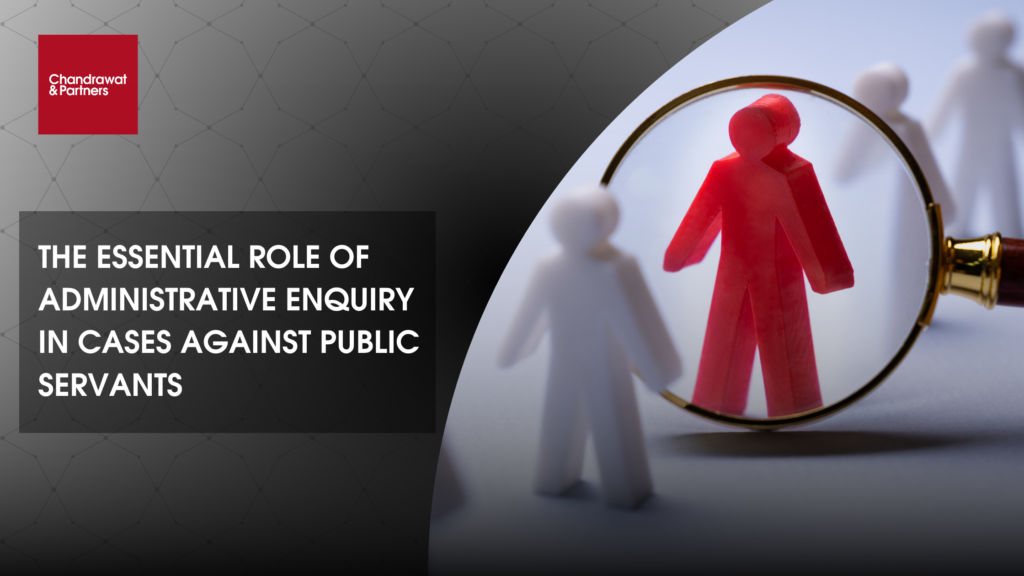
Share :
THE ESSENTIAL ROLE OF ADMINISTRATIVE ENQUIRY IN CASES AGAINST PUBLIC SERVANTS
In a recent landmark decision, the Supreme Court of India ruled that the absence of a recommendation by an administrative enquiry precludes taking cognizance of an offence against a public servant under the Schedule Caste and Schedule Tribes (Prevention of Atrocities) Act, 1989. This verdict, reversing the findings of the High Court, underscores the necessity of administrative scrutiny before penal proceedings to be initiated for dereliction of duty by a public servant.
THE CASE BACKGROUND
The case in question, titled THE STATE OF GNCT OF DELHI AND OTHERS VERSUS PRAVEEN KUMAR @ PRASHANT, revolved around allegations against a Station House Officer (“SHO”) who reportedly failed to register an FIR for an offence under the SC/ST Act. The trial court initially dismissed the action against the SHO due to lack of recommendation from an administrative enquiry. However, this decision was overturned by the High Court, which directed proceedings against the SHO.
SUPREME COURT’S STANDPOINT
The bench, comprising Justices MM Sundresh and SVN Bhatti, clarified that under Section 4(2) of The Scheduled Castes and the Scheduled Tribes (Prevention of Atrocities) Act, 1989 (the “Act”) , the recommendation of an administrative enquiry is a sine qua non—an essential condition for initiating penal proceedings against a public servant for willful neglect or dereliction of duty. The Court emphasized that the proviso to Section 4(2) of the Act serves as an intrinsic safeguard, preventing the initiation of prosecution based solely on complaints without preliminary administrative investigation.
The Supreme Court held that the administrative enquiry is crucial to ascertain whether the public servant’s omission or commission was bona fide or willful. This enquiry ensures that the conduct of the public servant is thoroughly examined, thus preventing unjust penal actions.
KEY OBSERVATIONS AND IMPLICATIONS
The Supreme Court’s judgment highlighted several critical points:
- Administrative Enquiry as a Prerequisite: The Court made it clear that the recommendation from an administrative enquiry is mandatory before a court can take cognizance of an offence under Section 4(2) of the Act.
- Magistrate’s Role: In cases where a complaint is filed without such recommendation, the magistrate must call for a report from the relevant department before initiating proceedings against the public servant.
- Legal Precedent: This judgment aligns with the Delhi High Court’s decision in the case of BIJENDER SINGH V. STATE AND ANR., reinforcing the necessity of an enquiry report before initiating criminal proceedings under the Act.
PROCEDURE FOR MAGISTRATES
The Court outlined the procedure for magistrates dealing with complaints against public servants. If a complaint lacks a recommendation from an administrative enquiry, the magistrate must seek a report from the concerned department. The Special Court or the Exclusive Special Court, based on this report, can then take cognizance of the alleged offence and direct penal proceedings if necessary. This procedure ensures that the magistrate has both the complainant’s accusation and the department’s view while deciding whether to take cognizance of the offence.
ANALYSIS
The Supreme Court’s decision in this case sets a significant precedent, ensuring that public servants are not subjected to unwarranted penal proceedings without due administrative enquiry. This judgment not only upholds the procedural integrity of the Act but also protects public servants from frivolous and baseless allegations.
By mandating an administrative enquiry, the Court has reinforced the importance of due process, ensuring that allegations of dereliction of duty are substantiated by a thorough investigation. This ruling is a crucial step in balancing the protection of marginalized communities under the Act with the rights of public servants to a fair and just legal process.
For more information or queries, please email us at
enquiries@chandrawatpartners.com



